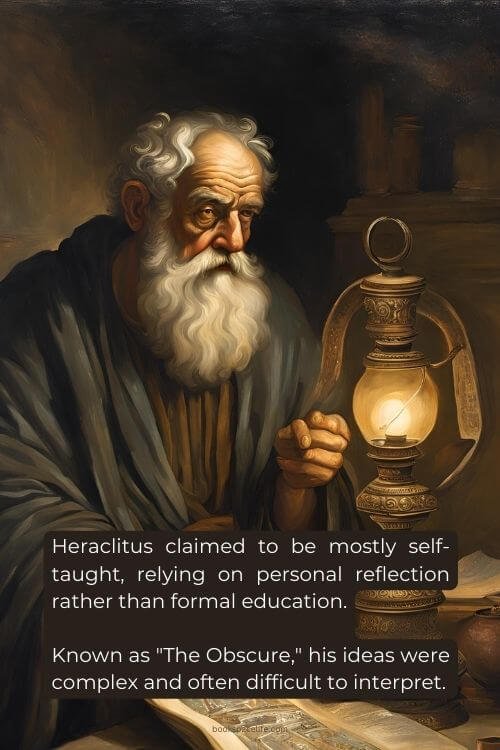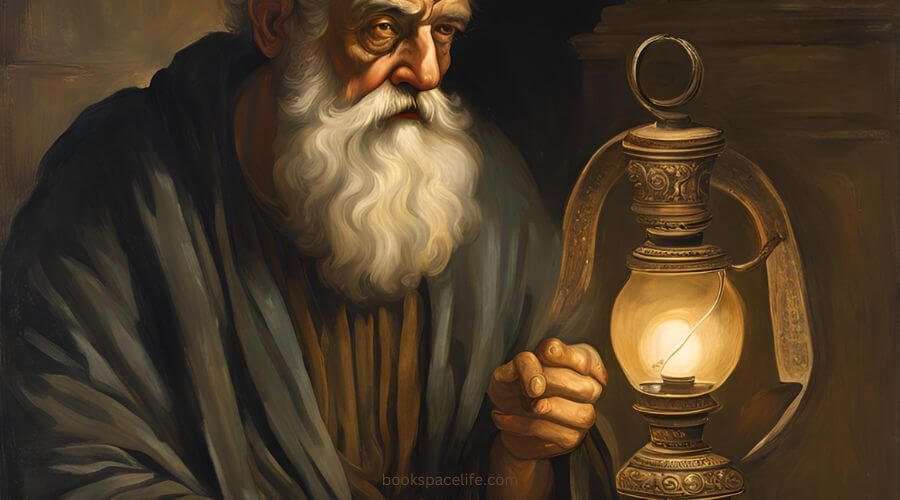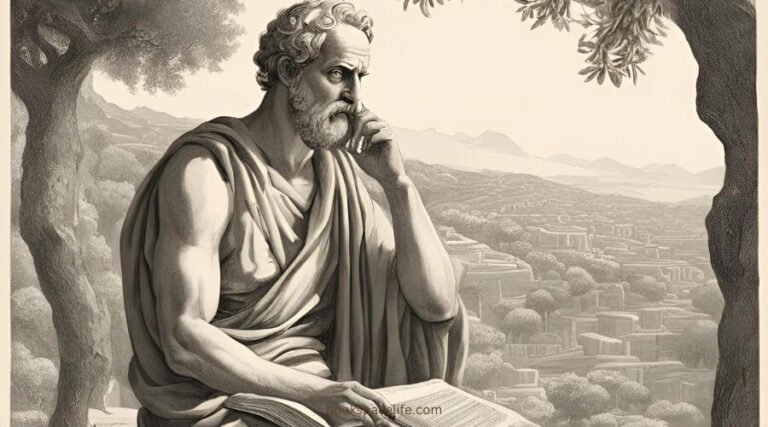Thales of Miletus
Heraclitus: The Philosopher of Change and Unity
Heraclitus of Ephesus (535 – 475 BCE) is one of the most enigmatic (difficult to understand) figures in pre-Socratic philosophy, known for his profound insights into the nature of reality, change, and the underlying unity of opposites.
Often referred to as the “Weeping Philosopher” due to his melancholic demeanor and belief that life is characterized by conflict and struggle, Heraclitus’s ideas profoundly influenced the trajectory of Western thought.
His assertion that “everything flows” encapsulates his philosophy, which emphasizes change as the fundamental essence of the universe.
This blog post explores Heraclitus’s life, travels, early education, philosophical contributions, and lasting impact on philosophy and science.
Quick Read
Table of Contents
(1) Early Life and Education
Heraclitus was born in Ephesus, a major city in Ionia (modern-day Turkey), around 535 BCE.
Little is known about his family or early life, but it is believed that he came from a noble lineage.
Ephesus was a center of trade and culture, offering a rich environment for intellectual development.
The influence of earlier philosophers, such as Thales, Anaximander, and the Pythagoreans, likely shaped Heraclitus’s early thought.
Although there are few records detailing his formal education, it is widely believed that Heraclitus was largely self-taught.
His writings reflect a deep engagement with the world around him, indicating a philosophical development driven by observation and reflection rather than structured schooling.
Heraclitus’s early experiences in a vibrant city that served as a melting pot for different ideas and cultures likely contributed to his philosophical outlook.

(2) Travels and Philosophical Development
Heraclitus’s life was marked by a spirit of inquiry and a quest for knowledge, which may have included travels to other regions of Greece or beyond.
However, specific details about his travels are scarce. Unlike many philosophers of his time, Heraclitus did not establish a formal school or engage in public teaching, which adds to the mystery surrounding his life.
Instead, he chose to express his ideas through aphoristic writings, often characterized by paradoxes and dense language.
His primary work, the “Fragments,” survives only in parts, and it is through these remnants that we gain insight into his thought.
His philosophical reflections were often critical of the prevailing views of his contemporaries, and he emphasized the need for individuals to seek wisdom through introspection and observation.
(3) Philosophical Contributions
Heraclitus’s philosophy is best known for its focus on change, unity, and the nature of reality. His ideas can be summarized in several key themes:
- The Doctrine of Change: Heraclitus famously declared that “everything flows” (panta rhei), emphasizing that change is the only constant in the universe.
He believed that reality is in a perpetual state of flux, where nothing remains the same.
This perspective contrasts sharply with the views of his contemporaries, who often sought stability and permanence as foundational aspects of existence.
Heraclitus argued that understanding the nature of change is essential to grasping the essence of reality.
- Unity of Opposites: One of Heraclitus’s most significant contributions is his notion of the unity of opposites.
He posited that oppositional forces are interconnected and that conflict is essential for harmony.
For instance, he famously stated that “strife is justice” and that “war is the father of all things,” suggesting that opposing forces are necessary for the emergence of new realities.
This idea challenges the binary thinking that characterizes much of Western philosophy, inviting deeper contemplation of the complexities of existence.
- Fire as a Metaphor: Heraclitus used fire as a central metaphor in his philosophy, representing change, transformation, and the underlying unity of opposites.
He viewed fire as a symbol of life and dynamism, embodying the idea that reality is constantly in motion.
In his view, fire is both destructive and creative, mirroring the dual nature of existence itself.
- Logos: Heraclitus introduced the concept of the “Logos,” which can be understood as the rational principle governing the universe.
He believed that the Logos is the underlying order that connects all things, despite their apparent chaos and change.
This idea would later resonate with philosophers such as Stoics, who expanded upon the concept of Logos as a foundational principle of the cosmos.
- Critique of Conventional Wisdom: Heraclitus was critical of the prevailing beliefs and norms of his time, particularly the reliance on sensory perception and common opinion.
He believed that most people lived in ignorance, failing to recognize the deeper truths of existence.
He urged individuals to look beyond superficial appearances and to seek wisdom through philosophical contemplation.

(4) Influence and Impact
Heraclitus’s philosophical ideas have had a profound and lasting impact on various fields of thought, including philosophy, science, and literature. His contributions can be observed in several key areas:
- Influence on Later Philosophers: Heraclitus’s ideas greatly influenced later philosophers, including Socrates, Plato, and Aristotle.
His focus on change and the unity of opposites resonated with Socratic dialogues and Platonic thought, which grappled with the nature of reality and knowledge.
Aristotle’s understanding of substance and change also reflects Heraclitean themes.
- Foundation for Dialectical Thinking: The unity of opposites articulated by Heraclitus laid the groundwork for dialectical thinking in Western philosophy.
This approach, which emphasizes the interplay between conflicting ideas and the emergence of new understandings, is evident in the works of later philosophers, including Hegel and Marx.
- Impact on Science: Heraclitus’s emphasis on change as a fundamental aspect of reality has implications for scientific inquiry.
His recognition of the dynamic nature of the universe anticipates modern scientific understandings of evolution and the laws of thermodynamics.
The idea that change is inherent in all things aligns with contemporary views of the natural world.
- Influence on Literature and Poetry: Heraclitus’s aphoristic style and poetic language have inspired countless writers and poets throughout history.
His paradoxical statements and profound insights continue to resonate with those exploring the complexities of existence and the human experience.
- Cultural and Historical Significance: Heraclitus’s life and work reflect the rich intellectual culture of ancient Greece, characterized by a quest for knowledge and a willingness to challenge established beliefs.
His contributions represent a pivotal moment in the history of human thought, marking a transition from mythological explanations of the world to rational, systematic inquiries.
- Legacy in Philosophy and Education: Heraclitus’s philosophical ideas became part of the broader curriculum of ancient philosophical education.
His emphasis on change and the need for critical reflection on knowledge encouraged a culture of inquiry and critical thinking that would characterize later philosophical traditions.
(5) Conclusion
Heraclitus of Ephesus stands as a pivotal figure in the history of philosophy, whose profound insights into the nature of reality, change, and unity continue to resonate with contemporary thinkers.
His doctrine of change, the unity of opposites, and the concept of Logos invite us to reconsider our understanding of existence and the complexities of life.
Through his reflections on the dynamic nature of reality, Heraclitus challenged conventional beliefs and encouraged individuals to seek wisdom through introspection and observation.
His legacy endures in philosophical discussions, scientific inquiries, and literary explorations, reminding us of the transformative power of thought.
As we contemplate Heraclitus’s life and teachings, we are reminded of the importance of embracing change and recognizing the interconnectedness of all things.
His work serves as a testament to the enduring quest for knowledge and understanding, inspiring us to engage critically with the world and seek deeper truths amidst the chaos of existence.Top of Form
(A) 7 Quick Facts on Heraclitus
- Born in Ephesus: Heraclitus was born around 535 BCE in Ephesus, an ancient Greek city (Ancient Ionia; modern-day Turkey)
- Self-Taught Philosopher: Heraclitus claimed to be mostly self-taught, relying on personal reflection rather than formal education.
- “The Obscure” Known as “The Obscure,” his ideas were complex and often difficult to interpret.
- Concept of Change: Heraclitus believed in constant change, summed up by “you cannot step into the same river twice.”
- Fire as Primary Element: He considered fire the fundamental element, symbolizing transformation.
- Unity of Opposites: Heraclitus taught that opposites, like life and death, are interconnected and drive harmony.
- Critic of Tradition: He criticized poets, philosophers, and politicians for lacking true wisdom and understanding of nature.
(B) 10 Quotes attributed to Heraclitus
- You cannot step into the same river twice.
- Everything flows. Strife is justice.
- The only constant in life is change.
- Character is destiny.
- War is the father of all things.
- Listening not to me but to the Logos, it is wise to agree that all things are one.
- The road up and the road down are one and the same.
- The sun is new each day.
- We both step and do not step in the same rivers. We are and are not.
- All human beings are flawed, and our knowledge is limited.








